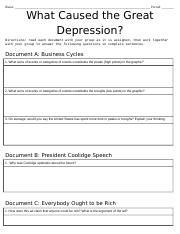The Great Depression, the longest and most severe global economic crisis of the 20th century, has left an ineffaceable mark on history. The calamity’s devastating impact raised profound questions about economic systems, social responsibility, and political leadership. To unravel the intricacies of this tumultuous period, we present a comprehensive guide to crucial questions that illuminate the causes and consequences of the Great Depression.

Image: www.coursehero.com
What factors contributed to the onset of the Great Depression?
The Depression erupted as a complex confluence of domestic and international factors. A rampant speculative frenzy in the stock market, coupled with insufficient regulation, led to the catastrophic stock market crash of 1929. This crash triggered a downward spiral, eroding investor confidence and causing a sharp decline in spending and investment.
How did the financial crisis reverberate through the economy?
The stock market crash sent shockwaves through the banking system, fostering a climate of fear and uncertainty. Bank withdrawals skyrocketed due to concerns over solvency, leading to bank failures and a drying up of credit. This financial crisis impeded businesses’ access to capital, leading to widespread layoffs and business closures.
What role did the gold standard play in exacerbating the Depression?
The gold standard, which pegged currency values to the price of gold, restricted governments’ ability to print money and engage in expansionary monetary policy. This inflexibility hindered efforts to stimulate economic recovery and prolonged the Depression’s grip on nations.

Image: www.coursehero.com
How did Hoover’s policies, including the Smoot-Hawley tariffs, impact the economy?
President Herbert Hoover’s decision to raise tariffs was intended to protect American industries from foreign competition. However, this measure inadvertently triggered a global trade war, reducing exports and further stunting economic recovery.
In what ways did the Depression impact social conditions?
The economic collapse had a devastating ripple effect on society. Widespread unemployment led to poverty, homelessness, and hunger. Starvation and malnutrition surged as individuals struggled to find sustenance. The despair and disillusionment prevalent during this time sowed seeds of radicalism and political unrest.
What coping mechanisms were employed by individuals during the Great Depression?
In the face of economic hardships, individuals devised ingenious ways to survive. Some bartered their belongings or services, while others formed self-help cooperatives. Shantytowns, also known as Hoovervilles, emerged as symbols of the societal upheaval caused by the Depression.
How did the Great Depression shape government’s role in the economy?
The devastation of the Great Depression prompted a re-evaluation of government’s economic responsibilities. The election of Franklin D. Roosevelt and the implementation of the New Deal marked a departure from the previous laissez-faire approach. Roosevelt’s policies aimed to stimulate the economy through increased government spending and interventionism.
What lessons can we learn from the Great Depression in preventing future economic crises?
The Great Depression provides invaluable insights for economists and policymakers in addressing contemporary economic challenges. It underscores the perils of unbridled financial speculation, emphasizes the need for effective financial regulation, and highlights the importance of coordinated international cooperation to prevent economic downturns.
What are the lingering impacts of the Great Depression that we still feel today?
The Great Depression left an enduring mark on the global economic landscape. It fostered a profound distrust of the financial system, led to a shift towards greater government intervention, and spurred the development of new policies aimed at preventing future economic calamities. The specter of severe economic depression serves as a reminder of the importance of sound economic governance and prudent monetary practices.
Questions To Ask About The Great Depression
Conclusion
The Great Depression stands as a stark reminder of the devastating consequences of economic failure. By recognizing the complexities that brought about this catastrophe and examining the government’s responses, we gain invaluable insights into the fragility of modern economic systems. Through historical exploration, we can better understand present-day economic challenges and work towards the development of policies that will bolster our resilience in times of uncertainty.